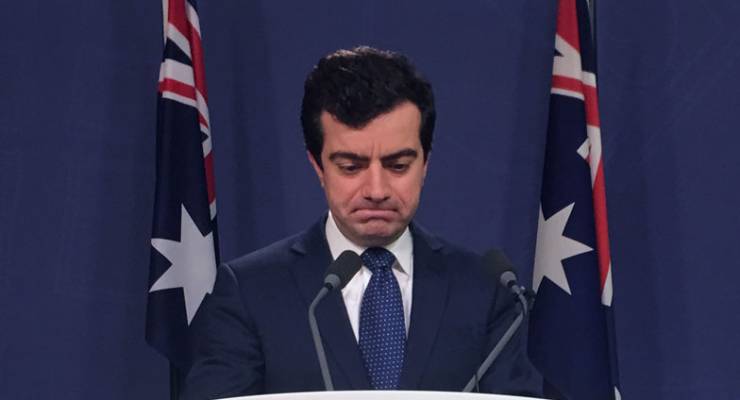
In my blog, Pearls and Irritations, on October 14 last year, I wrote:
“Compradors are sometimes described as those who help a foreign country exploit their own. I was reminded of this when I read that the ALP Caucus had compromised its concerns over jobs for Australians and was prepared to waive the China-Australia Free Trade Agreement through the parliament with only a ‘diluted’ list of demands as the AFR put it.
“If this agreement proceeds, Australian workers are likely to be much more vulnerable. Not surprisingly the President of the ACTU, Ged Kearney said that ‘this is about Australian jobs so we will keep fighting for those jobs’. No wonder the unions are unhappy about the attitude of Labor parliamentarians.
“There is a problem; a large Labor elite with fellow travellers whose careers outside parliament as consultants and lobbyists depend on Chinese connections and largesse. They are cultivated with money, travel and entertainment. They cling like limpets to the relationship with China. They have a lot to lose if they upset China. And it shows.
“As Upton Sinclair put it so succinctly ‘It is difficult to get a man to understand something when his salary depends on his not understanding it’.”
That was written almost a year ago. The problem has worsened since then.
And it is not just the Labor Party, including Sam Dastyari, who are compromised.
The problem extends across the political spectrum, and includes the funding of “think tanks” like the Australia China Relations Institute (ACRI) at UTS.
The Yuhu Group and Huang Xiangmo keep bobbing up — not just with a small contribution to Sam Dastyari’s expenses, but assistance to the Liberal Party and the former trade minister who negotiated the China Free Trade Agreement.
Gina McColl in the SMH on May 23, 2016, reported:
“A Chinese government backed propaganda unit and a swag of companies that stand to gain from CHAFTA have made more than half a million dollars of political donations in Victoria, raising concerns about the influence of foreign donors. Companies linked to Chinese conglomerate, Yuhu Group, made a donation to then Trade Minister Andrew Robb’s fund-raising entity, the day the trade deal was clinched. …
“Bayside Forum, which supports the Federal Liberal candidate in the seat of Goldstein (where Mr Robb is set to be succeeded by former Human Rights Commissioner, Tim Wilson, at the July 2 federal election), accepted $100,000 in donations from executives of Chinese agriculture property development and infrastructure company, Yuhu Group.
“At the time, Mr Robb was negotiating … CHAFTA. … Mr Robb was Mr Huang’s guest at the Melbourne Cup in 2013 when Mr Huang also presented the trophy … As Trade Minister Mr Robb also attended the ‘Yuhu 2015 Giving Day’ on February 6, 2015, held in part to celebrate Mr Huang’s election as President of the Australia Council for the Promotion of Peaceful Reunification of China.”
Then there is the relationship between Huang Xiangmo and the Australia China Relations Institute at the University of Technology Sydney. Fact sheets from ACRI were extensively used by government ministers and also the ALP to promote the passage in Parliament of CHAFTA
On my blog I have posted many articles about government exaggerated claims concerning the national benefits of FTAs. CHAFTA was no exception. But ACRI embarked on a dubious propaganda and public relations campaign to persuade federal MPs to ignore those who had expressed major reservations about the benefits of CHAFTA, including the ACTU.
As Primrose Riordan in the AFR has pointed out, ACRI played a very important part in persuading ALP members in federal Parliament to wave through CHAFTA with only minor amendments. She pointed out that ACRI “is partially funded by Yuhu Group head Huang Xiangmo, who is also Chairman of the ACRI board”. (Peter Martin at SMH says the Yuhu Group provided $1.8 million.)
Riordan added that:
“Mr Huang is so central to the Institute, he recently told the AFR he personally appointed former foreign minister Bob Carr to be its director. Labor and the Coalition came to an agreement on CHAFTA in late October last year after a fierce debate about labour conditions for migrant workers.”
In the parliamentary debate, government ministers and members quoted extensively from ACRI “fact sheets” to support CHAFTA. The ALP joined in to help send CHAFTA through Parliament despite union and other concerns about the employment effects of the deal. It was clear that because Australia had reduced tariffs over a considerable period we didn’t have many more tariff reductions to bargain away in return for improved access to the Chinese market. Instead, CHAFTA traded away conditions for Australian workers.
The compradors have been having a field day in promoting Chinese interests. It is time the issue was addressed and particularly, it is time for major reform of political donations.
In 2009, then-special minister of state senator John Faulkner proposed major reforms in such donations. Among other things, the changes would have prohibited foreign and anonymous donations and reduced the donations disclosure threshold from $12,800 to $1000 and removed indexation. The legislation was blocked in the Senate by the Coalition with the help of Family First senator Steve Fielding.
China is becoming an important part of Australian life. There are concerns, however, about the mobilisation of Chinese students, real estate purchases, agricultural land acquisitions, investment in electricity grids, funding institutes like ACRI at UTS and donations to political parties. We need to get the balance right, because there are clearly substantial benefits in the relationship. But there are risks that need to be attended to. If we fail to address them, the growing anti-Chinese sentiment will continue to fester and be exploited.
*This article was originally posted at John Menadue’s Pearls and Irritations







China has a foreign policy and an industry policy. Australia seems to have neither.
Australia: the bunny in the Chinese headlights!
Never get between a politician and a pile of someone else’s money.